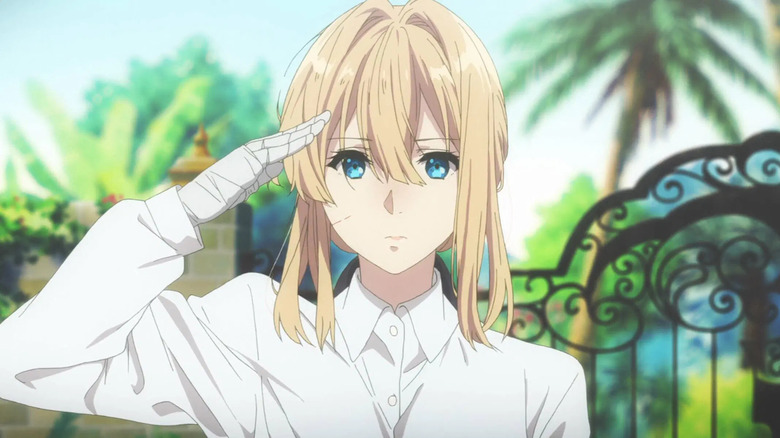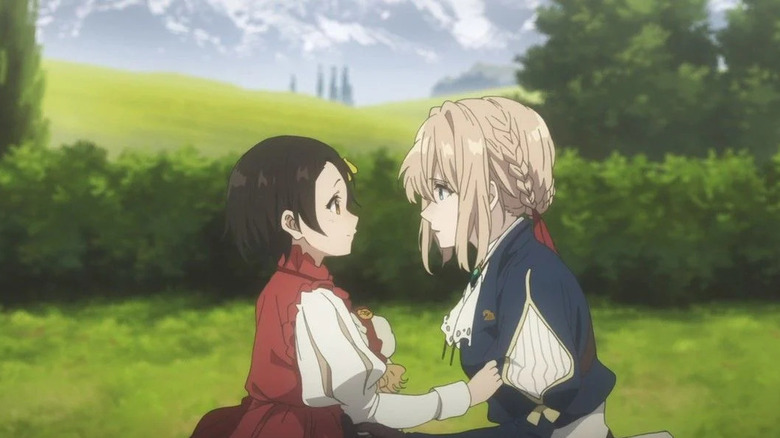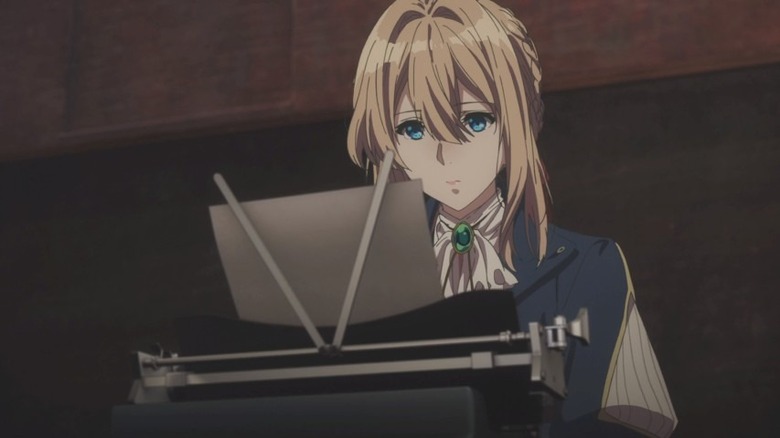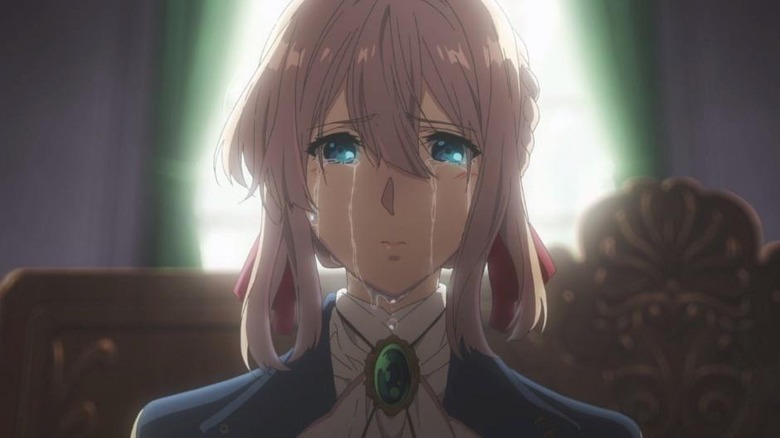Violet Evergarden Is A Tear-Jerking Anime About Empathy And Humanity
(Welcome to Ani-time Ani-where, a regular column dedicated to helping the uninitiated understand and appreciate the world of anime.)
I've written before about how horror anime doesn't always work because the medium of animation (except for stop motion) inherently makes it harder to create a feeling of dread and horror. While that is true, it is not the same with melodramas, of which there are many in anime. There are many shows that deliver truly stunning pieces of emotional art that make tears flow like rivers (and I've covered some right here).
Yet there are few anime dramas that are capable of ripping your heartstrings and tying them in knotty messes while also delivering feature film-level quality in TV form quite like "Violet Evergarden," a show that is part tech demo for Kyoto Animation, and part experiment in empathy (seeing how much a show can make the audience cry in 30-minute intervals).
The show follows the titular Violet, a former child soldier who is haunted by the last words her commanding officer said to her: "I love you." Plagued by trauma and PTSD, Violet becomes an Auto Memory Doll (essentially a ghostwriter) who helps people write letters to express the things they can't express with their own words. From there, the show becomes a lovely, incredibly moving, impossibly emotional exploration of trauma, empathy, and the lasting power of words. It is one of the most gorgeous shows of the past few years, and a testament to the skills of the team at Kyoto Animation in crafting visually stunning and deeply emotional stories.
What makes it great
In some ways, "Violet Evergarden" feels like a tech demo, the anime equivalent of the "Crysis" video game. Kyoto Animation is a powerhouse studio, unparalleled in expressiveness and character animation. The show features backgrounds as realistic as a Makoto Shinkai movie, with the character expressions and fluid movements making the characters feel alive. Because it's not only Violet, but the rest of the ensemble cast and the one-off characters we meet in each episode that truly make the story memorable.
And it's not just the movements, but the overall look of the world of the anime. The Victorian-inspired time period is full of excess, stunning costumes and landscapes, intricate hairstyles, and beautiful buildings. Still, it is arguably Violet's mechanical arms, animated in 2D, that serve as the centerpiece display of artistry.
The show's main plot and backstory for Violet overcoming her upbringing as a child solder has some interesting moments, as we slowly come to understand that Violet's robotic nature and the neutral expression on her face are because she has spent all her life repressing those emotions while growing up on the battlefield.
Where "Violet Evergarden" shines the most, however, is when it becomes an episodic story wherein Violet travels to different places helping different people by writing letters. Each episode manages to tell a standalone, individual story that rips your heart out and tears it into tiny little pieces, like a whole season made out of the first 10 minutes of Pixar's "Up," particularly episode 10.
What it adds to the conversation
When "Violet Evergarden" becomes an episodic story, it also becomes a story about a trauma-ridden child soldier learning about empathy and how to connect with others. In an early episode, Violet, whose work as a ghostwriter is mostly about capturing the hidden emotional intent of her clients, completely misunderstands the assignment and writes verbatim what she is told. Her slow development, her failures and the way she learns from them make Violet a compelling and complex character.
As the series goes on, Violet becomes an excellent writer, learning to pick up on the subtextual meaning of people's words, which is where "Violet Evergarden" is at its most thematically resonant. By focusing specifically on the written word (the show is set right before the invention of the telephone), the anime explores the often unforeseen impact that words have, the deep emotional meaning a certain choice of words can have on someone. From a mother wanting to make sure her child has some words of comfort after she's gone, to a love-struck teen not sure of how to express herself, "Violet Evergarden" is a masterclass in the importance of words, of art.
Then there's the movie, which came out in 2020 in Japan, right in the middle of the pandemic and a year after a devastating arson attack on one of the Kyoto Animation offices. Not only is the film a beautiful send-off to the story of Violet, and yet another gorgeous-looking film from the studio behind the tear-jerker "A Silent Voice," but an even more powerful tribute to the 36 people who died in the tragedy.
Why non-anime fans should check it out
This column has covered everything from popular action shonen, to bizarre comedies, epic space operas and more, but I haven't really written about the prominence of anime stories that pull at the heartstrings the way only Pixar can in the U.S. "Violet Evergarden" is a beautiful story that is familiar enough in its aesthetics and stories to be enjoyed with zero prior knowledge or connection to anime, but also a story that could only be told this effectively in animation.
It is the kind of story that, because of the stylistic choices when it comes to performance, to backgrounds, to production design, works in animation where each of those decisions can be controlled and molded. And yet, at its core, it is a deeply human story of emotional connections and empathy, with a central character that — by the end of the story — becomes as human as any live-action character out there.
Watch This If You Like: "A Silent Voice," "The Notebook," "Your Name."
"Violet Evergarden" is streaming on Netflix.



